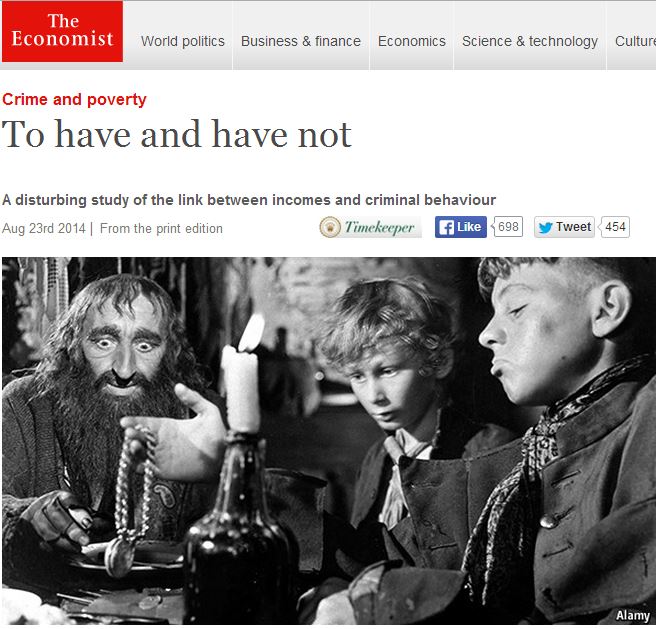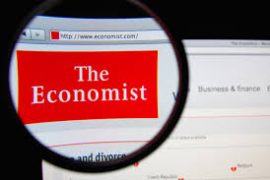Cross posted from the blog of David Porush

But The Economist just published a story entitled “To Have and Have Not: A disturbing study of the link between income and criminal behavior” that pushed me over the edge. Atop the piece is very large picture of Fagin the Jew from a movie version of DIcken’s Oliver Twist.
Type “Fagin the Jew” into Google (Images or Web) and you will see how viral and anti-Semitic this character portrait is historically.

Fagin is used by Dickens as symbol of explicitly Jewish criminality and his portrayal even in the 1948 (!) film, from which this image is taken, truly captures Dickens’ animus. See this discussion of Dickens’ anti-Semitism:
The Oxford Dictionary of English Literature describes Dickens as nationalistic often both stigmatising foreign European cultures and taking his attitude to “colonized people” to “genocidal extremes”,[3] albeit based mainly on a vision of British virtue, but not on any concept of heredity. One of the best known instances of this is Dickens’ portrait of Fagin in one of his most widely read early novels Oliver Twist, which has been seen by some as deeply antisemitic, though others such as Dickens’ biograper “G.K.Chesterton” have argued against this notion. The novel refers to Fagin 257 times in the first 38 chapters as “the Jew”, while the ethnicity or religion of the other characters is rarely mentioned.
The Economist article itself resurrects traditional anti-Jewish libels of inherent or congenital criminality by gratuitously placing a photo of a Jew to accompany a report about a study in Sweden. The study has not one mention of Jews, literature, Dickens, the 19th century, or even crime in England. But it does suggest:
“…a family’s culture, once established, is “sticky”—that you can, to put it crudely, take the kid out of the neighbourhood, but not the neighbourhood out of the kid. Given, for example, children’s propensity to emulate elder siblings whom they admire, that sounds perfectly plausible. The other possibility is that genes which predispose to criminal behaviour (several studies suggest such genes exist) are more common at the bottom of society than at the top, perhaps because the lack of impulse-control they engender also tends to reduce someone’s earning capacity.”
This is either dumbfounding insensitivity or gratuitous stereotyping, especially at a time when passions are aroused against Jews in the UK, the EU, and elsewhere. In its choice of images, The Economist has either purposefully inflamed matters or merely, casually, offhandedly confirmed its good old upper crust Brit anti-Jew bigotry.
Further, even if it’s just a poor or thoughtless choice, it’s part of a pattern. The Economist‘s anti-Israel agenda has been clear for a long time. However, they now make clear that their bias blurs the distinction between anti-Israel and anti-Jew. Maybe I’ve gone over the edge and have become enamored of the view from here. Look, I’ll tell on myself: I cancelled my subscription to The New York Times for its clear bias after five decades of reading it religiously. Yup, this former liberal Brooklyn Jew has become a bit unnerved.
Or maybe I’m not crazy. Maybe The Economist‘s cool posture of civil, rational analysis obliges it to be held to a higher standard. Maybe I just can’t abide the UK’s and EU’s pretenses and get some bad boy frisson from ripping off their masks.
Please join me in protesting to The Economist directly at letters@economist.com and asking for an apology.
Also feel free to use any verbiage herein to help make your point.
David Porush




